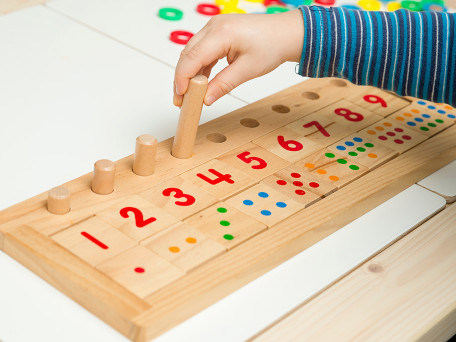Playful Learning of Math Equivalence: Design, Testing, and Analysis of a Game with Children and Caregivers
- 项目计划:
- 杰出青年学者计划
- 项目年份:
- 2023/24
- 项目负责人:
- 詹昀蓁博士
- (幼儿教育学系)

By involving stakeholders in the design process, we will design a game that is engaging, feasible, and culturally relevant for children, parents, and teachers to use in home and classroom environments.
Early math performance has substantial long-term impacts on children’s achievement and life outcomes, yet few resources are available for math learning in early childhood within and beyond Hong Kong. The lack of developmentally appropriate resources has led educators to adapt primary school instruction for preschoolers, negatively impacting children’s later achievement. To address this urgent need, we will work with stakeholders to design, test, and analyze math learning through a game. The game will leverage action and perception to support learning of math concepts (i.e., equivalence), language (e.g., more, after, between), and relations between numbers (e.g., 3 is less than 4). We focus on these knowledge and skills because they have lasting impacts on important outcomes, such as general math achievement and abstract reasoning. First, we will work with children, parents, and teachers to design a game and in-game support for language and numerical skills using readily accessible play materials. Second, we will conduct an experiment to examine the effects of various in-game support on math learning. Specifically, kindergartners will play the game for four 20-minute sessions in one of four conditions that includes support for language only, number only, both, or neither (i.e., free play control). We will measure children’s math concepts, language knowledge, and numerical skills before and after the play sessions to quantitatively examine the effects of different support on these aspects of knowledge and skills. Third, we will work closely with caregivers to qualitatively analyze children’s learning behaviors during game play. We aim to identify the mechanisms through which language and numerical skills support learning of math concepts. This research is significant and innovative in several ways. By involving stakeholders in the design process, we will design a game that is engaging, feasible, and culturally relevant for children, parents, and teachers to use in home and classroom environments. This participatory design work will also inform future research and development of games that support playful learning. The findings from the experiment will reveal whether language and numerical skills support learning of math concepts. Delineating the learning mechanisms will inform theories of math development and provide curricular implications on appropriate sequences of instruction. Finally, by working with stakeholders on the interpretation of data, the project will provide practical insights into learning and ways to support it among young children across everyday contexts. Ultimately, this work will contribute to theories and practices for early math learning.








